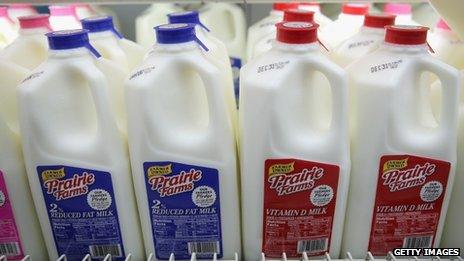Fiscal cliff: Will Americans get hit in the pocket?
- Published

Will the fiscal cliff hit the price of American milk?
US President Barack Obama and congressional leaders are now in the final stages of negotiations to avert a budget crisis known as the fiscal cliff.
Economists have warned that allowing a combination of deep, across-the-board spending cuts and tax rises to take effect on 1 January could have painful consequences for the US economy, and the rest of the world.
But, with time running out to ratify a deal to avert the fiscal cliff, lawmakers remain at loggerheads in Washington.
If the US goes over the fiscal cliff, correspondents say that almost everyone would be affected. Here are a few of the ways ordinary US taxpayers could be hit.
Payroll tax cut expires
The expiration of a temporary 2% cut in Social Security contributions could affect about 125 million households, with a significant impact on the bottom 20% of taxpayers.
On average, families with incomes of about $50,000 would lose about $1,000 (£619) per year as a result of the change.
The payroll tax cut, enacted by President Obama in 2010, reduced taxpayer contributions to the national retirement scheme to 4.2% from 6.2%. It is estimated to have cost the government about $120bn each year, according to the Wall Street Journal, external.
Neither Democrats nor Republicans have pushed for an extension of this provision, but the White House has suggested that one should be considered.
Long-term unemployment benefits expire
Emergency benefits providing up to 47 weeks of financial assistance to those who have been unemployed for more than six months are set to expire on 29 December.
About 2 million people would be cut off from benefits immediately if the scheme is not renewed, and a further 1 million people could see their benefits dry up by April.
Mr Obama has included an extension of these benefits, which the independent Congressional Budget Office says, external costs about $30bn, in his proposal to avoid the fiscal cliff. But many Republicans oppose such a move.
The price of milk could double
A five-year farm bill is also set to expire at the end of the year and if lawmakers, distracted by fiscal cliff negotiations, fail to renew or replace the legislation, Americans could see the price of milk rise significantly.
In the absence of a new law US farm policy would default to its 1949 version, forcing the government to buy milk at a price calculated on old milk production costs, the Washington Post reports, external.
This could drive milk prices up to $6-$8 per gallon, from a current price of about $3.65.
Cutting federal compensation for doctors
At the end of the year the amount of compensation doctors get from the government for treating patients on government programmes could drop by 27%.
Every year since 2003 Congress has passed a "doc fix" - a short-term arrangement that makes up the difference between what doctors should get paid according to a set formula and the amount needed to ensure their salaries are stable.
Failure to renew the $20bn provision could impose a significant salary cut for some doctors.
Widening the inheritance tax net
Inheritance taxes are due to rise in 2013, potentially making thousands of estates eligible for taxation.
Current rules state that inheritance below $5m per deceased benefactor is exempt from taxation, and the top rate is 35%. But rates could go up to as much as 60% as the taxable threshold drops to $1m.
Republicans and Democrats both oppose such a steep rise in inheritance tax.